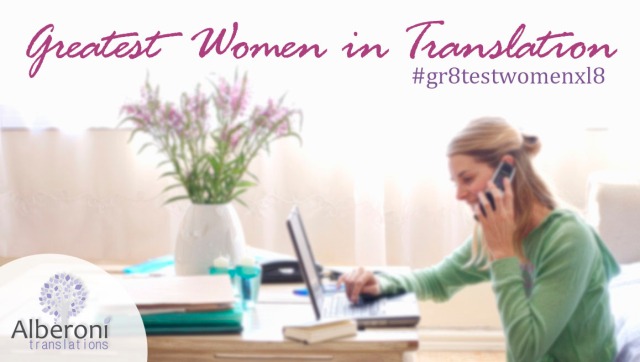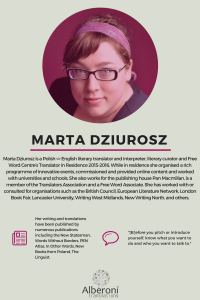
Created by Érick Tonin
Welcome back to our Greatest Women in Translation interview series!
Women in Translation month is over this year, way buzzier than the previous years, but we can keep doing our job here, interviewing and recognizing the great women we have in translation.
Please welcome Marta Dziurosz, nominated by Canan Marasligil.

Created on Canva
1. The first literary translation job you found on your own was at a book fair in Poland: you say you introduced yourself “at the stall of every publisher, left them some hand-made materials […] and one of them bit.” If you had to do it again, would you do anything differently? What advice would you give to those who are starting out and would like to do the same thing you did?
That was a surprisingly successful strategy for a completely different time and place – I wanted to start translating from English into Polish, and it was perhaps ten years ago. The market of translated literature in Poland is massive, which has all the predictable problems, but it also means it was comparatively easy to start working this way. My relationship with that one publishing house lasted for seven years and I was very happy to be working with them. The thing is I am now doing it again, but the other way round – translating from Polish into English, which is a completely different kettle of fish. The market is tiny and because the resources for publishing translations are so much more stretched, you need to be more canny when introducing yourself if you want to be successful. I won’t lie – it does help to be in London and meet people personally, but exciting things in translation-focused publishing are also happening in the North, with the Northern Fiction Alliance and the focus on translation during the Edinburgh festival. Edinburgh, just like the London Book Fair, the Literary Translation and Creative Writing Summer School in Norwich, Translate at City and International Translation Day, are great focal points of the year when you get a massive shot of industry knowledge, so it’s great to try and be there. People on ETN (the Emerging Translators’ Network) usually have good tips on where to stay. In general, preparation is key – before you pitch or introduce yourself, know what you want to do and who you want to talk to. On the other hand, though, chance encounters and conversations are also great and potentially fruitful. Finally, read widely in your language to see what you like, and read as many books as you can translated into English from your language, see how they do it and ask yourself why.
2. Being a non-native translator of English yourself, you talk a lot about this controversial subject (here, for example). You say you are “increasingly confused about who a native speaker really is” (link above). Why is that?
I want to help make it less controversial. The reason why I am confused about this term is that you’d have to be wilfully ignorant not to see that people arrive at languages at various stages of their lives and through various circumstances.
Language competence, cultural sensitivity, suppleness of phrase, a sly sense of humour, an ear for nuance – these are not exclusive to “native” speakers.
The division between “native” and “non-native” defines the latter negatively, as if through some sort of lack, and “non-native” is frequently used as a shorthand for “in need of linguistic instruction”. I wrote an article about this for The Linguist and a good few people emailed me saying they’ve been holding themselves back in their careers because they felt it wasn’t the done thing to translate into a language you’d come into later in life. Isn’t that a shame?
3. You work at Pan Macmillan, drafting and negotiating most of their translators’ contracts. As you say, it “is an interesting peek behind the scenes” and gives you “the chance to mediate between the two sides of the deal” (link in Q1). What have you learned, as a translator, with this experience? And what advice would you give to translators regarding contracts based on this experience?
As a translator, remember that the person you’re negotiating your contract with (sometimes it will be a dedicated contracts person, sometimes not) is a human being, and not your enemy. Both sides want the deal to happen (preferably on good terms and with the minimum of hassle). Don’t be afraid to ask questions and to negotiate for your preferred terms, but pick your battles and know when to gracefully accept a compromise. Remember that the terms of your contract will to some extent depend on the terms of the “head” contract – that is, the contract your publisher signs to buy rights in the book with the original rights holder (for example, the publisher of the original Spanish book you’re translating into English). If you’re a member of the Translators’ Association, you can use their free contract vetting service, or you can listen to a podcast of an event about this I chaired at Free Word, to cover the basics.
4. You have recently presented a keynote on scents in literature. “The purpose of the talk was to reflect on the many ways in which scent is used in literature to evoke emotions and tell stories,” as you point out in the event’s blog, where you also provide a reading list related to the topic. Could you explain in more details what translating scent is all about?
We had a whole panel discussion about it at Free Word. I am very interested in the transmission of ideas; in this case between words and scents and vice versa. The perfumer Thomas Fontaine recently said in an interview: “Perfume is a story; we get a story from a, for example, fashion brand, and we translate that into fragrances”. At the Free Word event, it was fascinating to discuss the embodiment of a brief into a fragrance, and the translation of scent into literature, as well as translating a book about scents from French into English. When making a transition between languages, or between scent and text, what gets carried across? You can dig pretty deep in that topic, and Ricarda Vidal, one of the participants of the discussion, did just that in her Translation Games project.
5. You are an Associate of London’s Free Word Centre, and were their 2015-2016 Translator in Residence. As a TiR, last year, as part of Free Word’s celebrations around International Women’s Day, you chaired a panel discussion on women in translation, a topic that has everything to do with this series. How can we tackle this gender imbalance in international literature and make a difference? Do you think initiatives such as Women in Translation help somehow?
Of course I am incensed that we still need to discuss this, but we do still need to discuss this. A few recent lists of recommendations for books in translation included barely any women authors, and in terms of review space (dramatically scarce as it is), percentages of books in translation published and event/panel appearances the field is still far from level. The initiative you mention, the new Warwick Prize for Women in Translation, And Other Stories’ idea of publishing only women in 2018 – looking at the history of publishing and the endless years when focusing exclusively on men didn’t even warrant a comment or a moment of reflection, I’d personally say they are very necessary. They make us reflect a bit more about what we read, where we find our recommendations, who we support with our money, attention and time, whose perspective we find worthwhile.
6. As an advocate of Polish literature, what book, in particular, do you recommend for someone who would like to start exploring it? As you already recommended a few that have not been translated yet in your interview to Jen Calleja (link in Q1), it can be one that has been already translated.
The most beautiful Polish book I’ve recently read in translation was Olga Tokarczuk’s Flights, translated by Jennifer Croft and published by Fitzcarraldo. I reviewed it for the Glasgow Review of Books – it’s a beautiful, tender look at people in transit, a personal encyclopedia of travel, movement, migration.
7. Now it’s your turn to nominate our next Great Woman in Translation.
I’d like to nominate the eminent German translator Charlotte Collins, whose work I admire – this is for very selfish reasons, I’d just like to know more about her practice!
Pingback: Greatest Women in Translation: Charlotte Collins | Carol's Adventures in Translation